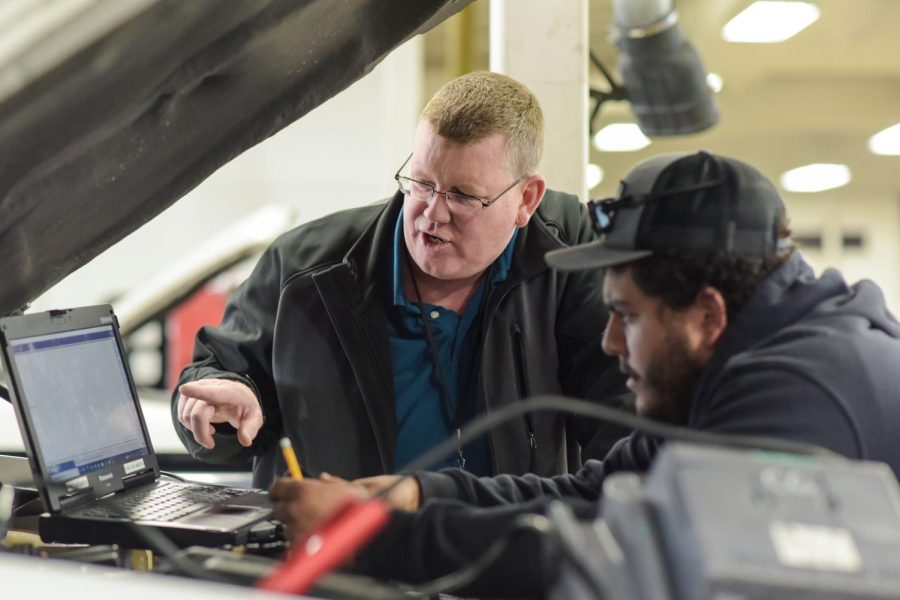Auto program thrives in the fast lane
Automotive program at Brookhaven Campus leverages corporate sponsorships to provide up-to-date training for student success.
Shane Baxter, lead Ford ASSET instructor, goes over vehicle diagnosis on an exhaust gas recirculation system with Jeramie Byrd, an automotive student, in the automotive garage behind Q Building. The automotive program at Brookhaven Campus began in 1978.
April 13, 2022
The smell of rubber and oil and the whirring sound of car lifts fill the automotive garage at Dallas College Brookhaven Campus. In this space, students learn the latest industry trends and how to solve any problems they may face in the field.
Brookhaven’s automotive program has been producing top-of-the-line auto technicians for dealerships since 1978.
A track record of 100% in placement goes to show how much both David McNabb, the associate dean of advanced automotive technology, and Shane Baxter, lead Ford instructor at Brookhaven, work tirelessly to provide all they know to their students, making them the best mechanics for future employers.
“We have two missions here: We are going to help people find careers, and we are going to help meet the industry needs,” McNabb said.
There are several paths to take along the way. There is a spot for all students who are willing to learn, work and excel in the forever changing automotive industry.
One major industry change is that all dealerships are eventually moving toward electric cars. Fortunately, the students in the program are ready to learn and work on all electric cars coming out in the future.
McNabb said because of the access to corporate sponsorships, the students in the program have access to the same training, the latest components and tools used on electric cars.
“Those changes come to us automatically as they train their own technicians,” he said. “We have the same training. I have four Nissan Leafs out here right now. The beauty of [Corporate sponsorships] is that those sorts of things are automatic.”
Austin Mcintyre, who came to the program at the advice of his employer, said his manager insisted he enroll to further his training. Mcintyre said: “I’ve learned a lot. I have learned a lot more than I thought I would have learned and that has benefited me significantly.”
McNabb and Baxter are program alumni. Because of their first-hand experience, they push their students to be fully trained and ready to work in the automotive world after graduation.
“They have to successfully complete a working co-op, which is where the employer evaluates them,” McNabb said. “Not just us, and that has been a real game changer. So, in other words, you can’t graduate from here without having a job.”
McNabb and Baxter said they have a lot of pride and belief in the program and the students who go through it.
“If a student plays the program right, they are going to have a two-year associate degree,” McNabb said. “They are going to have two years of on-the-job experience, and they are going to have some ASE certifications, which is the industry standard for technician competency.”
With a résumé of experience and education in hand, students have a better chance at standing out in the crowd of people looking for jobs.
With more than 70 years combined experience and knowledge, McNabb and Baxter have a great deal of information to pass on to their students.
“The truth is that we have to be where the rubber meets the road, right,” McNabb said. “We can give you a strong engine, but if we don’t have a transmission and someone willing to put it in drive and step on the gas, we’re not gonna go anywhere.”
Baxter said the sponsorship with Ford happened due to Marilyn Kolesar-Lynch, former vice president of resource development, who had already started the program with General Motors.
“[Marilyn] decided to try to do the same partnership with Ford, and Ford was looking to start a similar automotive program,” Baxter said. “They started in two places simultaneously, Brookhaven and a community college in Florida.”
The future looks bright as Baxter and McNabb have high hopes to grow the program.
“We hope to get bigger and bigger,” Baxter said. “We have a class of 23 right now and there is talk from Ford and us to try and double that within the next four to five years.”
Baxter said corporate sponsorships are important to the program. “They give us the special tools,” he said. “They give us money for scholarships. They give us money to purchase tools to purchase things for those cars.”
Without the sponsorship programs, they would not have the resources to purchase all that is needed to work on and to teach students with.
Current and future students can look forward to this program being around for the long haul.
Both Baxter and McNabb want the program to grow and have the best reputation possible.
They want the automotive industry to see Brookhaven as a definitive place for training students into technicians as well as the place for employers to hire their workforce.


